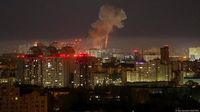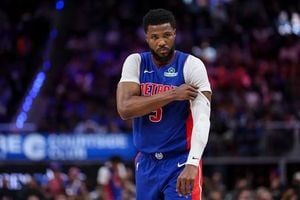In a significant development regarding the ongoing conflict in Ukraine, Russian President Vladimir Putin proposed direct negotiations with Ukraine set to take place in Istanbul on May 15, 2025. This proposal comes amidst increasing pressure from European leaders and the United States for Russia to accept a 30-day ceasefire to end the three-year war.
During a rare televised address, Putin emphasized the importance of starting these talks without any preconditions, stating, "We would like to start immediately, as early as next Thursday, May 15, in Istanbul, where they were previously held and where they were interrupted." He added that Russia is prepared for serious negotiations aimed at addressing the root causes of the conflict and achieving a lasting peace.
The proposal was made shortly after leaders from Germany, France, the United Kingdom, and Poland met with Ukrainian President Volodymyr Zelensky in Kyiv on May 10, 2025. They urged Putin to agree to a ceasefire starting on May 12, or face potential "massive sanctions," as noted by French President Emmanuel Macron during a symbolic visit to Ukraine. The White House has also backed this demand following a joint phone call with U.S. President Donald Trump.
Kremlin spokesman Dmitry Peskov responded to the European leaders' ultimatum by stating that Russia is "resistant to any type of pressure." He acknowledged that while Putin supports the idea of a ceasefire in general, there are many questions that still need to be addressed before any agreement can be reached.
In his address, Putin mentioned he would discuss the proposed negotiations with Turkish President Recep Tayyip Erdogan, as Turkey has previously hosted talks between Russian and Ukrainian officials. He reiterated that the decision now rests with Ukrainian authorities, denying any rejection of dialogue from Moscow's side.
"We do not exclude that during these conversations there may be a possibility to agree on some kind of new truce, a new ceasefire," Putin stated, framing the talks as a first step toward stable and lasting peace. However, he did not directly respond to the European leaders' call for a ceasefire, instead pointing out that previous ceasefire agreements had been violated by Ukraine.
Putin's comments about the "root causes" of the conflict often refer to grievances towards Kyiv and the West, including NATO's eastward expansion and the alleged need to "denazify" Ukraine. On May 8, Trump expressed on his platform Truth Social that if the ceasefire is not respected, the U.S. and its partners would impose more sanctions, reflecting a growing frustration with Russia's indecision.
Macron reacted to Putin's proposal by stating it was a "first step, but not enough," emphasizing that unconditional ceasefires cannot be preceded by negotiations. He highlighted the urgency of a ceasefire as a means to save lives, stating, "The unconditional ceasefire is not preceded by negotiations, by definition."
Trump, on the other hand, expressed optimism regarding the situation, saying on May 11, "Potentially a great day for Russia and Ukraine!" He emphasized the importance of working with both sides to bring an end to the conflict, highlighting the potential for saving countless lives.
Despite the diplomatic overtures, the situation on the ground remains tense. Reports indicate that Russia has launched a new wave of air attacks against Kyiv, with the city’s mayor confirming drone strikes occurred shortly after Putin's announcement. This escalation raises concerns about the sincerity of Russia's peace proposals.
In the backdrop of these developments, the war in Ukraine has now reached its 1,173rd day since the beginning of the invasion. The Volunteer Coalition has called for a 30-day truce, threatening Moscow with increased sanctions if their demands are not met. Meanwhile, NATO’s head, Mark Rutte, has proposed increasing military spending to 5% of GDP by 2032, underscoring the ongoing military focus in response to the conflict.
As the world watches closely, the coming days will be critical in determining whether these negotiations can lead to a ceasefire and ultimately a resolution to the conflict. The international community remains hopeful for a breakthrough that could end the suffering and instability affecting millions in Ukraine and beyond.





